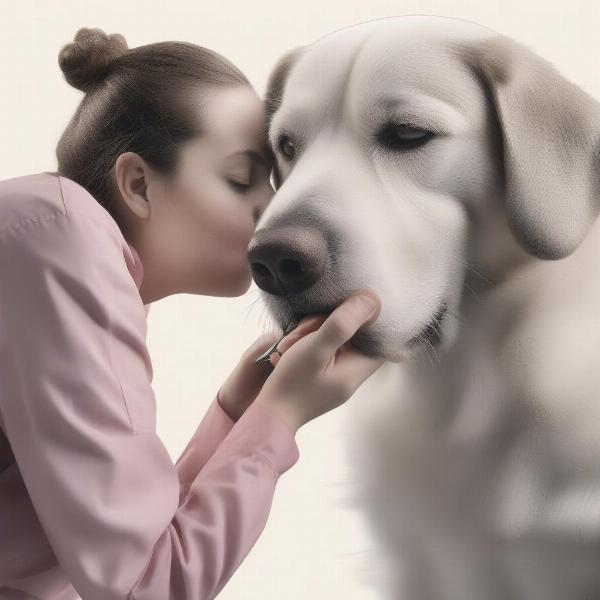If your dog is constantly licking his lips, it’s natural to wonder what’s going on. Lip licking can be a normal canine behavior, but excessive licking can sometimes signal an underlying issue. This article will explore the various reasons why your dog might be licking his lips, from simple thirst to more complex medical conditions, and help you determine when it’s time to seek veterinary attention.
Decoding Your Dog’s Lip Licking: Common Causes
Dogs lick their lips for a variety of reasons, and it’s often a subtle form of communication. Sometimes, the reason is as simple as anticipating a tasty treat. Other times, it can indicate something more concerning. Let’s delve into the most common culprits behind excessive lip licking.
Thirst and Dehydration
One of the most obvious reasons for lip licking is simple thirst. Just like us, dogs get thirsty, and licking their lips can be a sign they need a drink. Ensure your dog has access to fresh, clean water at all times, especially during hot weather or after exercise. Dehydration can be serious, so if you suspect your dog is dehydrated, consult your veterinarian.
Nausea or Upset Stomach
Lip licking can be a sign of nausea or an upset stomach. If your dog is also exhibiting other symptoms like vomiting, diarrhea, or loss of appetite, a digestive issue may be the cause. Changes in diet, food allergies, or even ingesting something they shouldn’t have can upset a dog’s stomach.
Stress and Anxiety
Just like humans, dogs can experience stress and anxiety. Lip licking can be a calming mechanism for them, a way to self-soothe in stressful situations. Loud noises, unfamiliar environments, or separation anxiety can all trigger this behavior. Observe your dog’s body language for other signs of stress, such as tucked tail, panting, or yawning.
Dental Problems
Dental pain or discomfort can also cause excessive lip licking. Broken teeth, gum disease, or oral infections can make it painful for your dog to eat or drink, leading to increased lip licking. Regular dental checkups and at-home dental care are essential for maintaining your dog’s oral health.
Allergies
Allergies, whether environmental or food-related, can manifest in various ways, including itchy skin and excessive lip licking. If you notice your dog is also scratching, chewing their paws, or experiencing skin irritation, allergies might be the underlying cause. A veterinarian can help identify and manage your dog’s allergies.
Neurological Issues
In rare cases, excessive lip licking can be a symptom of a neurological problem. Seizures, facial nerve paralysis, or other neurological conditions can sometimes affect a dog’s ability to control its facial muscles. If the lip licking is accompanied by other neurological symptoms, such as tremors, head tilting, or difficulty walking, seek immediate veterinary care.
When to Worry: Recognizing Serious Signs
While occasional lip licking is normal, persistent and excessive licking warrants further investigation. If your dog’s lip licking is accompanied by any of the following symptoms, it’s crucial to consult a veterinarian:
- Vomiting
- Diarrhea
- Loss of appetite
- Lethargy
- Changes in behavior
- Excessive drooling
- Pawing at the mouth
- Oral sores or lesions
What to Expect at the Vet
Your veterinarian will likely conduct a thorough physical exam and ask about your dog’s history and any accompanying symptoms. They may also recommend blood tests, urine tests, or other diagnostic procedures to determine the underlying cause of the lip licking.
 Vet Examining Dog
Vet Examining Dog
Tips for Managing Your Dog’s Lip Licking
While the underlying cause should be addressed by a veterinarian, there are some things you can do to help manage your dog’s lip licking:
- Ensure access to fresh water: Keep your dog’s water bowl full and clean.
- Offer a healthy diet: Feed your dog a balanced and nutritious diet appropriate for their age and breed.
- Reduce stress: Create a calm and comfortable environment for your dog, minimizing exposure to stressors.
- Provide mental stimulation: Engage your dog in activities that challenge their mind, such as puzzle toys or training sessions.
Conclusion
Excessive lip licking in dogs can be a sign of various underlying issues, from simple thirst to more complex medical conditions. By carefully observing your dog’s behavior and consulting with a veterinarian, you can identify the cause and ensure your furry friend receives the appropriate care. Don’t hesitate to seek professional advice if you’re concerned about your dog’s lip licking.
FAQ
- Is it normal for dogs to lick their lips occasionally? Yes, occasional lip licking is a normal canine behavior.
- When should I be concerned about my dog’s lip licking? If the licking is excessive, persistent, or accompanied by other symptoms like vomiting or diarrhea, you should consult a veterinarian.
- Can stress cause a dog to lick its lips? Yes, stress and anxiety can trigger excessive lip licking in dogs.
- What should I do if my dog is constantly licking his lips? Schedule an appointment with your veterinarian to determine the underlying cause.
- Can allergies cause lip licking in dogs? Yes, both environmental and food allergies can cause itchy skin and lip licking.
- What tests might my vet run to diagnose the cause of lip licking? Your vet may recommend blood tests, urine tests, or other diagnostic procedures.
- How can I help reduce my dog’s stress? Create a calm environment, provide mental stimulation, and consider using calming aids like pheromone diffusers.
ILM Dog is your trusted international resource for comprehensive dog care information, from breed selection to health, training, and nutrition. We connect dog owners worldwide with reliable advice and expert insights to nurture happy, healthy canine companions. Whether you’re a seasoned dog owner or just starting your journey, ILM Dog provides the knowledge you need. Contact us at [email protected] or +44 20-3965-8624 for expert guidance. Learn more about us at ILM Dog.